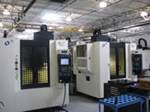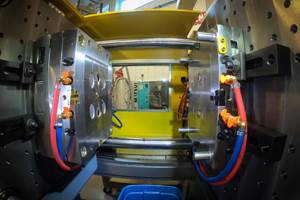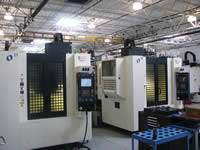Niche Auto Molds Prove to Be a Profitable for Cavalier Tool
Capitalizing on its specialty of molds for fans and shrouds in the automotive industry—on their own terms with no PPAP—drives this moldmaker’s success.
Established in 1975, Cavalier Tool & Manufacturing, Ltd. (Windsor, ON) has made a name for itself as a manufacturer of mid- to large-size molds and is sought out for its automotive fan, fan shroud and other tolerance-critical molds in the automotive industry. Earning this reputation has allowed Cavalier the luxury of favorable payment terms—progressive payments and not PPAPs—and achieve success in this market during a time when a majority of automotive work is going overseas.
According to Cavalier Tool President Brian Bendig, the company routinely builds 20 to 30 molds for automotive fans and shrouds per year. He acknowledges that he would secure more automotive work if he would accept PPAP terms, but he believes PPAP is an uncontrollable factor of the supplier base given the exchange rate. “We do not accept any PPAP terms,” he states. “We take progressive payments (see Be Proactive, Not Reactive). We need the industry as a whole to say no to PPAP. However, everyone is too hungry and it’s difficult to say no when there is no work coming in.”
Become an Expert
Bendig notes that Cavalier is one of North America’s biggest producers of molds for fans and fan shrouds in the automotive industry. Carving out this niche has guaranteed them repeat automotive business. “Even though we don’t accept PPAP, everyone out there knows we do such a good job with this product, they accept our progressive payment terms,” Bendig states. “Progressive terms also help to reduce the cost of the mold as there are no added finance costs.”
Early involvement also is paramount, Bendig maintains. “This is why we do so well with fans and shrouds,” he explains. “We have done them for so many years; we know the ins and outs. We already know the approximate shrink value, warp and windage; and can pre-calculate these factors to make the mold right. We cut the tool wrong to mold it right (purposely overcut or undercut based on our calculations). Once it is done cooling and the warp and windage processes are complete, the part is fairly accurate and may require as little as one change. There are competing shops that often have an additional four to six samplings to get it right. This is all very complex, and where our competition would waste time trying to make these calculations, we are already very successful in the design phase resulting in a very quick completion of the project with significant cost savings to the customer.
“At the end of the day, we are looking at companies that value a tool shop that really does it better than the rest—like us—and they are willing to give us progressive payments,” Bendig continues. “It has become a partnership rather than a competition; we tend to avoid the ‘low-ball’ pricing as we have a proven successful track record. Our tooling is awarded on success—not price like most automotive jobs where the low guy wins the work.”
Another automotive avenue to explore is the trend of auto manufacturers using one component on multiple product lines. “This can hurt the moldmaker because there are fewer tools out there,” he acknowledges. “But, because the volumes are higher, the auto makers need a capacity tool, which are multiple identical tools (up to four or five). If you are lucky to get one, strong chance you will get the capacity tools behind it.”
Bendig also welcomes the opportunity to become an expert at any new and upcoming automotive opportunities. “It is great that auto manufacturers may be coming out with new product lines, because anytime that happens, it means more plastic,” he says. “Green cars tend to be lighter and more fuel-efficient; the auto makers try to use more plastics to get that lighter weight.”
The Road Ahead
Bendig advises moldmakers to diversify to get through tough times and to be in a position to develop future growth. The company has always prided itself on multiple product lines in industries like recreation, consumer products, lawn and garden, outdoor products, and medical. “Automotive is very cyclical with most product launches typically in the fall,” Bendig explains. “Thus, most tooling gets launched at similar times. An advantage of not having all your eggs in one basket is preventing the highs and lows in the sale cycle. You can pick up other products during slow times to maintain even sales month after month. This is very important for managing cash flow, body count, layoffs, etc.”
It also is paramount to keep investing in new technology, processes and equipment. “We have invested in a lot of equipment over the past year,” Bendig comments, “like high-speed machining, CNC and some design programming software to design and build molds faster and more accurately with less labor. We are also expanding our technology in the area of automated manufacturing by bringing in palletized machines. This allows Cavalier to produce more volumes and reduce our labor costs. What can we get into our building that no one else has to give us a competitive advantage? We’ve been going to auctions to get ‘near new’ equipment at less than half the new rate. Because of all of this, our sales have increased almost 17 percent year-to-date. We are doing everything we can to attract more business so companies continue to seek us out because of our expertise, speed to market and aggressive business approach.”
Related Content
Predictive Manufacturing Moves Mold Builder into Advanced Medical Component Manufacturing
From a hot rod hobby, medical molds and shop performance to technology extremes, key relationships and a growth strategy, it’s obvious details matter at Eden Tool.
Read MoreThe Role of Social Media in Manufacturing
Charles Daniels CFO of Wepco Plastics shares insights on the role of social media in manufacturing, how to improve the “business” side of a small mold shop and continually developing culture.
Read MoreHands-on Workshop Teaches Mold Maintenance Process
Intensive workshop teaches the process of mold maintenance to help put an end to the firefighting culture of many toolrooms.
Read MoreHow to Foster Innovation Through a Culture of Education, Mentoring
Dynamic Tool Corp. shares its strategy for building a team with the right attitude and aptitude to deliver innovation that meets customer expectations.
Read MoreRead Next
Elite Mold & Engineering: Team Elite
Being both a moldmaker and a molder allows Elite Mold to be a one-stop team for its customers and the MoldMaking Technology 2009 Leadtime Leader Honorable Mention Award: Small Shop.
Read MoreReasons to Use Fiber Lasers for Mold Cleaning
Fiber lasers offer a simplicity, speed, control and portability, minimizing mold cleaning risks.
Read MoreHow to Use Strategic Planning Tools, Data to Manage the Human Side of Business
Q&A with Marion Wells, MMT EAB member and founder of Human Asset Management.
Read More





















